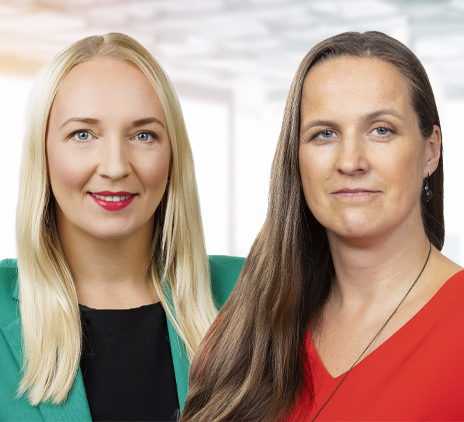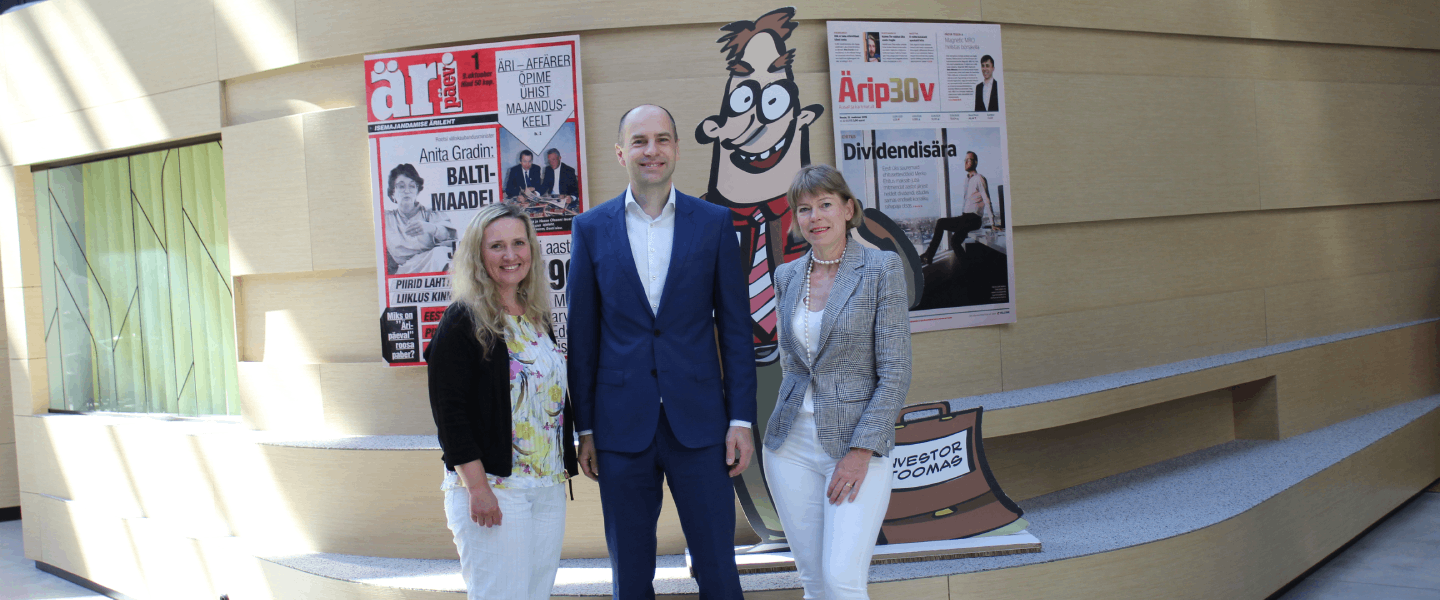-
Other audit services
We help clients with the application and use of foreign financial aid of EU and other funds and help prepare financial reports.
-
Audit calculator
The calculator will answer if the company's sales revenue, assets or number of employees exceed the limit of an inspection or audit.
-
Payroll and related services
We perform payroll accounting for companies whether they employ a few or hundreds of employees.
-
Tax accounting
Grant Thornton Baltic's experienced tax specialists support accountants and offer reasonable and practical solutions.
-
Reporting
We prepare annual reports in a timely manner. We help to prepare management reports and various mandatory reports.
-
Consolidation of financial statements
Our experienced accountants and advisors help you prepare consolidation tables and make the consolidation process more efficient.
-
Consultancy and temporary staff
Our experienced specialists advise on more complex accounting transactions, rectify poor historic accounting, and offer the temporary replacement of an accountant.
-
Outsourced CFO service
Our CFO service is suitable for companies of all sizes and in all industries. We offer services to our clients in the required amount and competences.
-
Assessment of accounting processes
We help companies to implement accounting practices that are in compliance with local and international standards.
-
Accounting services for small businesses
We offer affordable service for small businesses. We help organize processes as smartly and cost-effectively as possible.
-
Cryptocurrency accounting
We keep up with blockchain technology to serve and advise crypto companies. We are supported by a network of colleagues in 130 countries.
-
Trainings and seminars
Our accountants have experience in all matters related to accounting and reporting. We offer our clients professional training according to their needs.

-
Business advisory
We offer legal support to both start-ups and expanding companies, making sure that all legal steps are well thought out in detail.
-
Fintech advisory
Our specialists advise payment institutions, virtual currency service providers and financial institutions.
-
Corporate advisory
We advise on legal, tax and financial matters necessary for better management of the company's legal or organizational structure.
-
Transaction advisory
We provide advice in all aspects of the transaction process.
-
Legal due diligence
We thoroughly analyze the internal documents, legal relations, and business compliance of the company to be merged or acquired.
-
In-house lawyer service
The service is intended for entrepreneurs who are looking for a reliable partner to solve the company's day-to-day legal issues.
-
The contact person service
We offer a contact person service to Estonian companies with a board located abroad.
-
Training
We organize both public trainings and tailor made trainings ordered by clients on current legal and tax issues.

-
Business model or strategy renewal
In order to be successful, every company, regardless of the size of the organization, must have a clear strategy, ie know where the whole team is heading.
-
Marketing and brand strategy; creation and updating of the client management system
We support you in updating your marketing and brand strategy and customer management system, so that you can adapt in this time of rapid changes.
-
Coaching and development support
A good organizational culture is like a trump card for a company. We guide you how to collect trump cards!
-
Digital services
Today, the question is not whether to digitize, but how to do it. We help you develop and implement smart digital solutions.
-
Sales organisation development
Our mission is to improve our customers' business results by choosing the right focuses and providing a clear and systematic path to a solution.
-
Business plan development
A good business plan is a guide and management tool for an entrepreneur, a source of information for financial institutions and potential investors to make financial decisions.
-
Due diligence
We perform due diligence so that investors can get a thorough overview of the company before the planned purchase transaction.
-
Mergers and acquisitions
We provide advice in all aspects of the transaction process.
-
Valuation services
We estimate the company's market value, asset value and other asset groups based on internationally accepted methodology.
-
Forensic expert services
Our experienced, nationally recognized forensic experts provide assessments in the economic and financial field.
-
Business plans and financial forecasts
The lack of planning and control of cash resources is the reason often given for the failure of many businesses. We help you prepare proper forecasts to reduce business risks.
-
Outsourced CFO service
Our CFO service is suitable for companies of all sizes and in all industries. We offer services to our clients in the required amount and competences.
-
Reorganization
Our experienced reorganizers offer ways to overcome the company's economic difficulties and restore liquidity in order to manage sustainably in the future.
-
Restructuring and reorganisation
We offer individual complete solutions for reorganizing the structure of companies.
-
Corporate taxation
We advise on all matters related to corporate taxation.
-
Value added tax and other indirect taxes
We have extensive knowledge in the field of VAT, excise duties and customs, both on the national and international level.
-
International taxation
We advise on foreign tax systems and international tax regulations, including the requirements of cross-border reporting.
-
Transfer pricing
We help plan and document all aspects of a company's transfer pricing strategy.
-
Taxation of transactions
We plan the tax consequences of a company's acquisition, transfer, refinancing, restructuring, and listing of bonds or shares.
-
Taxation of employees in cross-border operations
An employee of an Estonian company abroad and an employee of a foreign company in Estonia - we advise on tax rules.
-
Tax risk audit
We perform a risk audit that helps diagnose and limit tax risks and optimize tax obligations.
-
Representing the client in Tax Board
We prevent tax problems and ensure smooth communication with the Tax and Customs Board.
-
Taxation of private individuals
We advise individuals on personal income taxation issues and, represent the client in communication with the Tax and Customs Board.
-
Pan-Baltic tax system comparison
Our tax specialists have prepared a comparison of the tax systems of the Baltic countries regarding the taxation of companies and individuals.
-
Recruitment services – personnel search
We help fill positions in your company with competent and dedicated employees who help realize the company's strategic goals.
-
Recruitment support services
Support services help to determine whether the candidates match the company's expectations. The most used support services are candidate testing and evaluation.
-
Implementation of human resource management processes
We either assume a full control of the launch of processes related to HR management, or we are a supportive advisory partner for the HR manager.
-
Audit of HR management processes
We map the HR management processes and provide an overview of how to assess the health of the organization from the HR management perspective.
-
HR Documentation and Operating Model Advisory Services work
We support companies in setting up HR documentation and operational processes with a necessary quality.
-
Employee Surveys
We help to carry out goal-oriented and high-quality employee surveys. We analyse the results, make reports, and draw conclusions.
-
HR Management outsourcing
We offer both temporary and permanent/long-term HR manager services to companies.

-
Internal audit
We assist you in performing the internal audit function, performing internal audits and advisory work, evaluating governance, and conducting training.
-
Internal Audit in the Financial Services Sector
We provide internal audit services to financial sector companies. We can support the creation of an internal audit function already when applying for a sectoral activity license.
-
Audit of projects
We conduct audits of projects that have received European Union funds, state aid, foreign aid, or other grants.
-
Prevention of money laundering
We help to prepare a money laundering risk assessment and efficient anti-money laundering procedures, conduct internal audits and training.
-
Risk assessment and risk management
We advise you on conducting a risk assessment and setting up a risk management system.
-
Custom tasks
At the request of the client, we perform audits, inspections and analyzes with a specific purpose and scope.
-
External Quality Assessment of the Internal Audit Activity
We conduct an external evaluation of the quality of the internal audit or provide independent assurance on the self-assessment.
-
Whistleblowing and reporting misconduct
We can help build the whistleblowing system, from implementation, internal repairs and staff training to the creation of a reporting channel and case management.
-
Sustainability advisory
We help solve issues related to the environment, social capital, employees, business model and good management practices.
-
Sustainability audit
Our auditors review and certify sustainability reports in accordance with international standards.
-
Sustainable finance
We help investors to analyze the environmental issues, social responsibility and good management practices of the company of interest.
-
Sustainable tax
Our international tax specialists define the concept of sustainable tax behavior and provide services related to sustainable tax behavior.
-
Digital strategy
We help assess the digital maturity of your organization, create a strategy that matches your needs and capabilities, and develop key metrics.
-
Intelligent automation
We aid you in determining your business’ needs and opportunities, as well as model the business processes to provide the best user experience and efficiency.
-
Business Intelligence
Our team of experienced business analysts will help you get a grip on your data by mapping and structuring all the data available.
-
Cybersecurity
A proactive cyber strategy delivers you peace of mind, allowing you to focus on realising your company’s growth potential.
-
Innovation as a Service
On average, one in four projects fails and one in two needs changes. We help manage the innovation of your company's digital solutions!


Experts say family businesses are generally more successful than the average, but nothing comes easy and it all requires a great deal of effort. “Of all forms of business, a family-owned company is the most penetrating, enduring and inclusive form. The main criterion for defining a company as a family business is that at least family members are in management and the majority of the shares are owned by the family, said president of the Estonian Family Business Association and CEO of Zenith Family OÜ, Kristel Meos, speaking on the Äripäev radio programme “Kasvukursil”.
Meos said family businesses can be small shops in the neighbourhood or large corporations such as IKEA, Kone, Bonnier or BMW. “For family businesses, it’s important to achieve strong business growth and keep family members dedicated and motivated,” she said.
Keeping relations in order
Meos says family business has three pillars. First ownership; second, managing the company; and third, good family relationships. "Often, philanthropy and CSR aspects can be added to the above,” said Meos. “And certainly, besides turning a profit, one has to be aware of relationships, which give advantages in business activity and help to avoid problems,” agreed another guest, Grant Thornton Baltic’s partner and Head of Audit Services, Mart Nõmper.
A member of the board of the Family Business Association and head of sales and marketing for the Büroomaailm office supply retailer, Kristiine Ross, stressed that success for a business comes from good relations at work and on the home front. “Problems arising at work shouldn’t get in the way of harmonious functioning of the family,” she said. “Furthermore, a family business should make sure that all employees are treated equally and respectfully, no one should be favoured because they are family,” said Ross. Everyone has to fulfil their duties with the same professionalism, she said.
If any one of the family members does not want to sign on to the company’s mission and works at cross-purposes to the business, Meos recommends nipping the problem in the bud. “People can be sidelined from the business but still remain a member of the family. It’s painful but later when they have children, things can mellow through them and the family line can be re-inserted into the business,” she said.
Point the way early for descendants
To reduce potential later conflicts in a family and make it easier to pass the torch, younger members should be included in the company’s activities from an early age. “The companies that last across generations are in the long run more successful than other companies," Meos said. “The key to getting by better is to engage with younger generations of family members in a planned way, think about how the company will be passed on and keep family relationships good and cohesive.”
Ross emphasized that smooth handover is ensured by the next generation being interested in what the company is doing. To achieve this, I would encourage the leaders to give the young responsibility and freedom from an early age,” she said. Nõmper added that descendants shouldn’t be expected to think the same way – they should be allowed to try new things. “Let’s recall that Andres also wasn’t able to pass on the farm, each successive generation has more options, so kids should be involved early,” he said, referring to a famous Estonian literary protagonist from Tammsaare.
Meos recommends getting youth involved through summer internships at the family business. “Give them simple duties, naturally they can’t aspire to leadership right away, but they get the feel for how complicated a process is, they also get a sense of the topics they can handle, and want to deal with in the future, and how they see their role in the family business.”
Nõmper said it was a good idea for potential successors to assume the leadership position for a certain set time. “Usually there are several people in a single generation and a fixed term allows other members of that generation to have a chance in leadership and thereby add their value added,” he said. That will also ensure that knowledge is more evenly distributed. “Families often worry about what will happen if some misfortunate befalls the head of the company – alcoholism, gambling problem or something else.”
An external consultant can help
To plan the future and course of a company, many places in Europe use a possibility called a family charter. “Estonia has started to see more of this practice too,” said Ross. Nõmper advises using the help of external experts to draft such a document. “Families often have subjects that are in a frozen state but an external party can ask about them and put these issues back on the table without any of the family members being associated with such a move.”
If the changing of the guard isn’t successful and there are no successors to be found, there are still a few options on how to proceed. “One way is to merge with another family business,” said Nõmper. “The management, if there are no family members there, can always buy out the company,” put in Ross.
Meos said selling is definitely not a bad idea, as that would free up capital for successors to start a new life.” They can do something else, do what they desire, based on their ideas and profile,” she said.
Contact us!
If you have similar challenges and questions, please contact our specialists.


